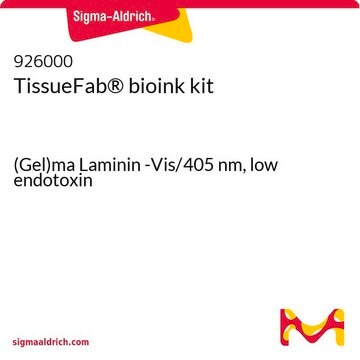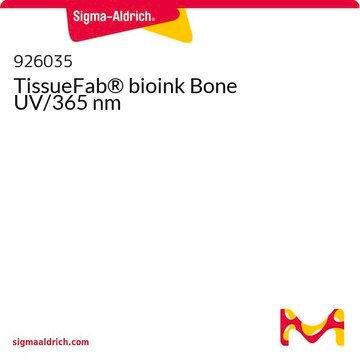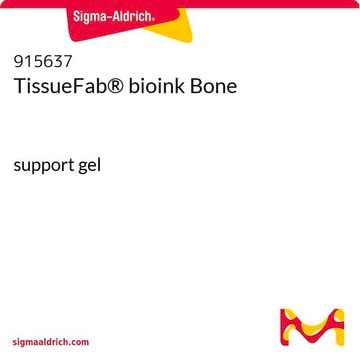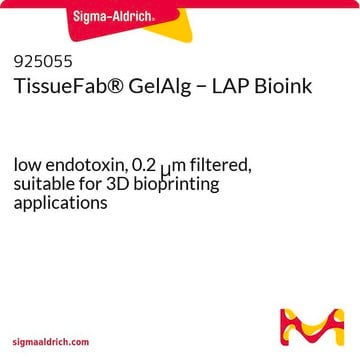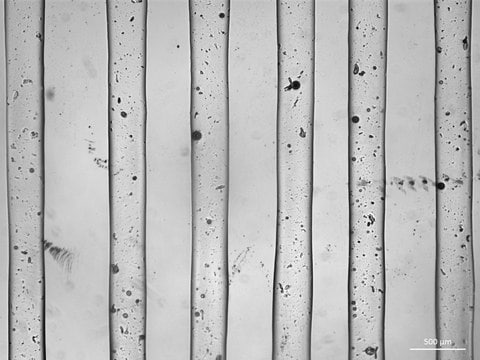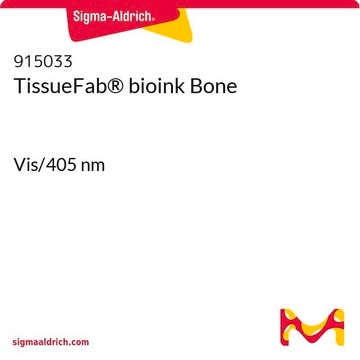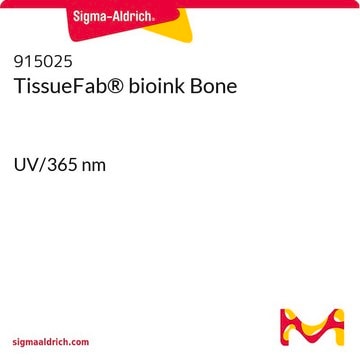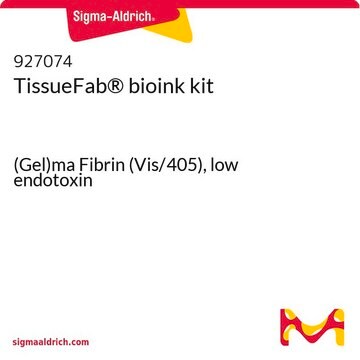926019
TissueFab® bioink kit
(Gel)ma Fibronection -Vis/405 nm, low endotoxin
Autenticatiper visualizzare i prezzi riservati alla tua organizzazione & contrattuali
About This Item
Codice UNSPSC:
12352201
NACRES:
NA.25
Prodotti consigliati
Forma fisica
viscous liquid (gel)
Misura
10 mL
Impurezze
<5 cfu/mL Bioburden
<50 EU/mL Endotoxin
Colore
pale yellow to colorless
pH
6.5-7.5
Viscosità
3-30 cP
applicazioni
3D bioprinting
Cerchi prodotti simili? Visita Guida al confronto tra prodotti
Categorie correlate
Descrizione generale
Gelatin methacryloyl (GelMA) is a polymerizable hydrogel material derived from natural extracellular matrix (ECM) components. Due to its low cost, abundance, and retention of natural cell binding motifs, gelatin has become a highly sought material for tissue engineering applications. Fibronectin is a multifunctional glycoprotein which exists as two major isoforms, one soluble and one insoluble form. The former is present in plasma, whereas the insoluble form resides in tissues and extracellular matrix (ECM) of cartilage. Fibronectin is known to contain integrin binding sequences which facilitate cell-matrix interactions.
Applicazioni
The addition of photocrosslinkable methacrylamide functional groups in GelMA allows the synthesis of biocompatible, biodegradable, and non-immunogenic hydrogels that are stable in biologically relevant conditions and promote cell adhesion, spreading, and proliferation. Gelatin methacrylate based bioinks have been used to bioprint osteogenic [1], chondrogenic [2-3], hepatic [4-6], adipogenic [7], vasculogenic [8], epithelial [6], endothelial [9-10], cardiac valve [11], skin [12], tumor [10] and other tissues and constructs. Fibronectin plays an essential role in multiple biological functions such as, angiogenesis, cell migration and differentiation and wound healing. Fibronectin has been used in tissue engineering applications for wound healing and angiogenesis[13], bone repair [14] and studying mechanotransduction[15].
Caratteristiche e vantaggi
In addition to fast gelation, the methacrylamide functional group can also be used to control the hydrogel physical parameters such as pore size, degradation rate, and swell ratio. Temporal and spatial control of the crosslinking reaction can be obtained by adjusting the degree of functionalization and polymerization conditions, allowing for the fabrication of hydrogels with unique patterns, 3D structures, and morphologies.
Note legali
TISSUEFAB is a registered trademark of Merck KGaA, Darmstadt, Germany
Codice della classe di stoccaggio
10 - Combustible liquids
Punto d’infiammabilità (°F)
Not applicable
Punto d’infiammabilità (°C)
Not applicable
Certificati d'analisi (COA)
Cerca il Certificati d'analisi (COA) digitando il numero di lotto/batch corrispondente. I numeri di lotto o di batch sono stampati sull'etichetta dei prodotti dopo la parola ‘Lotto’ o ‘Batch’.
Possiedi già questo prodotto?
I documenti relativi ai prodotti acquistati recentemente sono disponibili nell’Archivio dei documenti.
Il team dei nostri ricercatori vanta grande esperienza in tutte le aree della ricerca quali Life Science, scienza dei materiali, sintesi chimica, cromatografia, discipline analitiche, ecc..
Contatta l'Assistenza Tecnica.